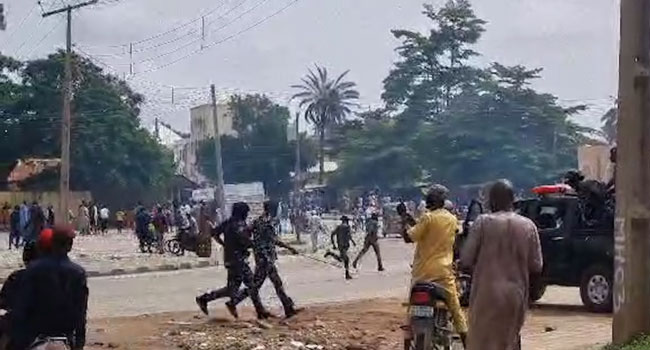The #EndBadGovernance protest in Bauchi State was interrupted when police fired tear gas at the demonstrators.
The protesters had assembled in front of the Emir of Bauchi’s palace, hoping to meet with the Emir, but were stopped by a police barricade.
Despite their persistence in seeking an audience with the Emir, the police dispersed the crowd using tear gas.
The youths remain adamant, insisting on their right to continue the protest.

Economic activities have come to a halt as the much-anticipated #EndBadGovernance protest began in several cities across the country. From Abuja to Abeokuta and Port Harcourt to Lagos, banks and businesses have closed, leaving roads unusually empty as protesters defy last-minute efforts by authorities to stop the demonstrations.
In Kaduna, typically bustling streets are deserted as protesters march to voice their grievances about poor living conditions. Nigeria, Africa’s most populous country, is grappling with soaring inflation and a sharply devalued naira after President Bola Ahmed Tinubu implemented economic reforms a year ago aimed at reviving the economy.
The protest movement, tagged #EndbadGovernanceinNigeria, has gained traction online, with many Nigerians struggling with 40 percent food inflation and fuel prices that have tripled since Tinubu’s reforms. In Abuja, security forces have blocked roads leading to Eagle Square, a planned protest site, while in Lagos, police and soldiers are stationed at key locations, including the Lekki tollgate, a site of violent protests in 2020.
Early turnout in Abuja and Lagos was modest, with only a few dozen protesters gathering outside the national stadium in Abuja, and police outnumbering demonstrators in the Ikeja area of Lagos.
“Hunger has brought me out to protest,” said 24-year-old Asamau Peace Adams outside the National Stadium in Abuja, attributing her frustration to “bad governance.”
A small group of protesters also gathered in the northern city of Kano, according to an AFP correspondent. On the eve of the protests, government officials urged young activists to reconsider the rallies and allow time for Tinubu’s reforms to take effect.
Many Nigerians are facing high costs for food and transport, and there is concern about potential insecurity during the protests. Despite this, protest leaders, a coalition of civil society groups, are determined to continue the rallies, rejecting legal efforts to confine them to public parks and stadiums.
The government has highlighted its efforts to alleviate economic hardship, including raising the minimum wage, distributing grains to states, and providing aid to the most vulnerable. “The government of President Tinubu recognizes the right to peaceful protest, but caution and vigilance should guide our actions,” said Secretary to the Government of the Federation, George Akume. “We urge Nigerians to choose peace, dialogue, and collaboration.”
The last major protest in Nigeria occurred in 2020 when young activists rallied against police brutality by the SARS anti-robbery squad. Those demonstrations, among the largest in Nigeria’s recent history, ended in violence in Lagos, with rights groups accusing the military of firing on peaceful protesters. The military, however, claimed they used blanks to disperse the crowd defying a curfew.
Nigeria’s protests are happening at the same time as unrest in Kenya, where President William Ruto has been forced to repeal new taxes and reshuffle his cabinet following weeks of anti-government protests, marking the worst crisis in his nearly two-year tenure.


